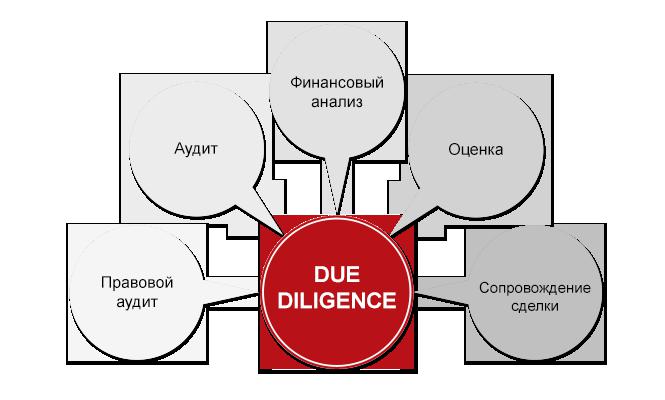Check seven times - buy once. If you rephrase a well-known saying, then the meaning of Due Diligence will become clear and what it is.
Literally, this phrase is translated from English as "due objectivity." In fact, in the business sphere, this is an objective and unbiased collection of information about the sold item, object, asset. An analytical Due Diligence procedure is accompanied by the issuance of an expert assessment prepared as soon as possible, which reliably argues the feasibility of a future transaction to acquire a planned object.
Fundamental stage before investing
First of all, Due Diligence is a procedure that identifies opportunities for improving the financial and legal spheres of a company.
It is a fundamental step prior to the purchase of assets. Due diligence, what is it in business? He helps the future investor:
- Form and optimize the acquisition of property or assets.
- Provide risks at the time of the transaction.
- Accurately identify possible crisis stages after the conclusion of investment agreements.
- Identify the commercial attractiveness of potential investments.
- Receive Due Diligence reports (accounting, tax and personnel), thereby ensuring maximum transaction transparency.
Why Due Diligence?
Modern market participants are faced with the need for risk management, this ensures the security of large companies and the successful development of small businesses. Every investor who is about to acquire a new business wants to receive comprehensive information about a future business partner.
The Due Diligence procedure is characterized by the achievement of certain goals, for example:
- reliable information about the financial activities of the company, the legality of the formation of its accounting, tax and statistical reporting;
- determination of the objective competitiveness of the organization;
- competency analysis of company management.
The facets of research objectivity
The importance of conducting the research procedure of an investment object is determined by the following factors:
- the investor, as a future owner, receives accurate and reliable information about the acquired property, based on a comprehensive, independent and professional analysis;
- the investor can operate on the obtained reliable data when drawing up his own calculations to determine the feasibility of investing capital, especially in cases where reconstruction or modernization of the acquired object is required;
- Due Diligence analysis and its results may affect the final price of the property, since the confirmatory method for determining the price is based on expert opinion.

When is it necessary?
As a rule, both the investor and the company that attracts investments are interested in conducting an independent analysis. At the same time, the investor has the opportunity to study in detail the future partner, and a company that wants to receive investments can confirm its good faith by attracting independent experts.
In this regard, there are situations when the initial stage of analysis due to Due Diligence must be carried out:
- The absorption of small businesses into larger ones, including the merger of organizations, enterprises, structures of various sectors of the economy.
- Acquisition of shares, investment in shares of other companies.
- The acquisition of any type of real estate, including land.
- Expansion of the company with the establishment of partners.
- Loans and loans for business development.
- Sponsorship or gratuitous targeted financing.
- Other financial operations in order to obtain commercial benefits when Due Diligence verification is carried out and information about the true data on the transaction object or on the invested project is required, which is transferred to the investor or buyer.
Practical solution to business problems
Nevertheless, the main goal of the Due Diligence report is not so much to study the effectiveness of future investments as to ensure the legal purity of transactions with real estate, that is, to ensure investment without negative consequences. World practice of this procedure is usually associated with various stages of the development of the company.
The following types of services are distinguished, depending on the tasks assigned:
- At the stage of a business project, an analysis of Seed Due Diligence (translated as "seed") is carried out, the purpose of which is to reject a new business idea or finance it.
- Analysis of a startup, when a company has just emerged, it has no experience and market value or history, therefore a professional check is carried out at the start of the project, in order to decide on additional financing.
- Erli Due Diligence - is carried out at the initial stage of development of the company, during the transition to the sale of the product as a result of the organization.
- Expansion analysis is associated with entering new markets, capturing the market with an unfamiliar type of product or service, with a further increase in production and taking into account additional marketing costs.
- Expediency or Bridge financing is aimed at studying the need for financing during the transfer of a company from a private to a joint-stock company with the registration of shares on exchanges.
- Turnaround Due Diligence is carried out in an era of crisis in order to stabilize the financial base of the company.
- Buy-Out management, Buy-In Due Diligence management (translation of abbreviations means "external purchase" and "external purchase", respectively), this type of research is organized in cases when the company intends to use borrowed funds to acquire a new business, or is preparing for redemption of your business by third parties.

In addition, there are situations where the company requires the Due Diligence procedure, examples of which are as follows:
- Low performance indicators of the company.
- Litigation related to the seizure of company assets.
- Violations discovered during tax audits.
- The decline in competitiveness and the strengthening of the position of competing firms.
- Settlement of labor disputes.
Due Diligence allows you to evaluate not only the current plans of the company, but also the development strategy, management system. It helps to find competitive advantages in the organization of production processes, optimization of pricing, to outline prospects than to justify the feasibility of the company.
How is independence and objectivity ensured?
For analytical research, specialists from various professional groups are involved. Due diligence analysis is carried out by three groups of specialists:
- Financiers - analysts and appraisers determine the value of the investment object at the current moment, explore the possibility of increasing or decreasing its future value, the prospects for using the analyzed asset in the future.
- Lawyers conduct a legal review of the organization's activities in order to identify risks associated with the acquisition of an object.
- Auditors check the financial and accounting statements for several periods, determine the possibilities of optimizing the tax base and analyze the results of past tax audits and tax risks.
Is it possible to do it yourself?
The length of the verification process usually depends on several factors. This may include the size of the analyzed business and the volume of materials for research. Sometimes an audit can take large periods of time, from a month to a year, and not every organization has a similar length of time.
In some cases, organizations independently conduct the Due Diligence procedure on their own.
The obvious benefits are:
- reduced inspection costs;
- acquisition by specialists of the organization of new knowledge in the field of analytics of the activities of their own organization;
- Accurate fixation of pain points of the business and the formulation of generative ways to overcome the crisis stages of the activity of your enterprise.
Despite the advantages of in-house verification, serious weaknesses are also found.
The main disadvantages of the independently conducted procedure:
- time and inability to carry out ongoing work by those specialists who are involved in the audit;
- lack of specialists of the required qualifications at the enterprise;
- another area of new business, which is difficult for analysis by specialists of the enterprise;
- independence and impartiality are difficult to control with internal audit personnel.
In this regard, independent Due Diligence is usually typical for small businesses.
And large investor organizations usually invite outside evaluators, financial and legal consultants. This allows you to get a comprehensive and objective analysis of the business.

Five main stages of Due Diligence. What it is?
In practice, the procedure consists of five independent stages, for each of which an objective conclusion is finally made.
Operational stage. At Operating Due Diligence analysts carry out the following actions:
- the structure of the company’s owners is determined by examining the constituent documents, determining the shares and rights of the owners, studying risks in this area;
- analyzes the correctness and legality of registration and issue of securities, transactions conducted on them;
- timeliness and completeness of dividend payments to shareholders are checked;
- a legislative audit of all property and other rights of the company is carried out;
- a report is prepared with fixation and a description of possible risks when satisfying the rights of owners, ways to eliminate risk situations.
The financial analysis. This stage is designed to study the financial performance of the company. Independent research is being carried out in the following areas:
- financial condition of the organization;
- assessment of the advantages and prospects of business development and acquisition opportunities;
- establishing the market value of an object;
- calculations based on financial stability, business activity and solvency ratios;
- preparation of a report with all indicators and ratios with a positive or negative conclusion.

Tax audit stage. The main The direction of analysis at this stage is to study the activities of the company in the context of several years of its financial activities in order to determine real financial indicators and future tax risks. This check may be called legal Due Diligence. What it is? The objects of study in this case are:
- financial statements;
- primary activities of the enterprise, analysis of production, fixed and non-fixed assets;
- availability of investments, receivables and payables;
- detection of hidden and off-balance accounts of the enterprise, hidden loan obligations;
- Timeliness of compulsory payment transactions is being studied.
- The legal prospects for optimizing the tax burden are determined;
- a report is prepared with a detailed description of all the risks associated with potential tax audits, recommendations for reducing risks.

Stage of legal analysis. Held Due Diligence is legal for the examination of title documents, disaggregated by type of asset acquired. At this stage, the following indicators are identified:
- volumes of assets existing in the company and their types;
- risk assessment from attraction of obligations of the company by government bodies or business partners:
- verification is carried out on the information bases of arbitrations, bailiffs, information codes;
- a report is being prepared with recommendations on protection against illegal disposal of assets from the company's turnover, a list of possible risks associated with the activities of the company, recommendations are made on the elimination of potential risks.
Marketing research stage. purpose marketing analysis is to determine and objectively evaluate the company's product in terms of its competitive advantages and commercial attractiveness. The stage is carried out in the following areas:
- identification of risks of a weak marketing policy of the company with an assessment of the market position of the company, its business reputation;
- comprehensive study of economic, legal, financial activities with a description of business processes, fixing indicators, which gave technical Due Diligence;
- analytical studies of competitors' products or assets and identification of advantages;
- recommendations for optimizing marketing activities;
- assessment of development prospects;
- preparation of presentation material based on the results of the audit.

Composition and significance of the report
There is no legislative act on the Russian market that governs the Due Diligence procedure. However, the need for such a procedure is growing exponentially.
Having ordered the procedure, the investor or the seller company receives a complete and objective analysis, recorded in the report, the results of which can be used to improve performance.
The procedure is completed and Due Diligence is provided to the customer. A sample report includes the following sections:
- Introductory part.
- Annotation of the results of the analysis.
- A section describing the history of the company, its position and business reputation.
- Definition of the structure, principle of organization, personnel of the company.
- Accounting and the use of information systems for competent accounting and tax reporting. Performance for several years.
- The movement of finance and the maintenance of the company's net assets.
- Tax liabilities and their implementation.
- Comprehensive company development forecast
- Other information identified during Due Diligence.
How it works or the demand for services
There are companies in the Russian market that provide expensive consulting services in this area. Basically, this is the so-called "Big Four", offering quality research services. In this case, the brand fully determines the cost of the procedure.
Sometimes the cost of the procedure is calculated in man-days, taking into account the costs of a specialist; the price depends on the amount of work, the detail of the technical Due Diligence task, and the speed of the analysis. However, the costs of the examination are more than offset by the results obtained.
For example, with Due Diligence of a land plot that was offered for purchase in the center of Moscow, the issue of preserving an ice cream factory was studied in detail. Specialists and experts of KSK groups, having analyzed the current situation, found that the risk indicators from a large number of tenants in the plant are normal, and the benefits of acquiring land are many times greater than the cost of the study.

The tempting outcome of an objective study
The Due Diligence procedure and the results of its implementation are objective and independent, and the impartiality and professionalism makes it possible to explore the business from a different angle, from different points of view. This is beneficial not only to the investor or potential buyer, but also to the seller company. This procedure helps to optimize the operation of the enterprise, avoiding unnecessary investments, timely eliminate errors and deficiencies in work. It also helps the customer to timely identify the possibility of future risks, to determine the conditions and objective growth of financial and production indicators.Minimizing or completely blocking entrepreneurial risks in the field of economics and law is the main objective of Due Diligence.
